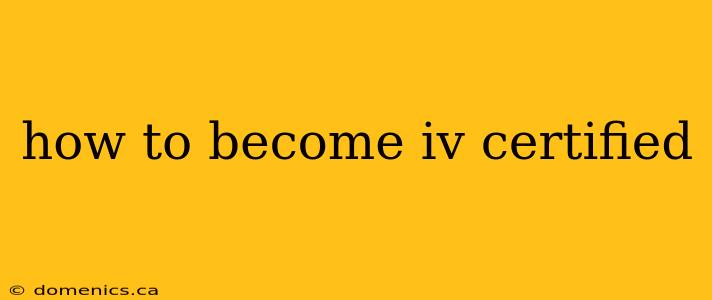Meta Description: Want to become an IV certified professional? This comprehensive guide outlines the steps, requirements, and certifications needed to become a qualified IV therapist. Learn about training programs, exam preparation, and career opportunities. Explore different certification options and find the path that's right for you.
What is IV Certification?
IV certification signifies that a healthcare professional has received specialized training and demonstrated competency in administering intravenous (IV) therapy. This isn't a single, universally recognized certification. Instead, various organizations offer certifications, each with its own specific requirements. The path to becoming IV certified involves education, hands-on training, and successful completion of an exam. This certification demonstrates a high level of skill and safety in this critical medical procedure. Obtaining IV certification is crucial for those working in roles requiring IV administration.
Types of IV Certification Programs
Several organizations offer IV therapy certification programs. The specific requirements vary, but generally include classroom instruction, hands-on clinical training, and an exam. Choosing the right program depends on your existing qualifications and career goals.
1. Specific Nursing Certifications:
Many nursing certifications might include IV therapy training as part of a broader curriculum. Registered Nurses (RNs) and Licensed Practical Nurses (LPNs) often receive IV training within their initial nursing programs. However, specialized IV certifications might offer more in-depth knowledge and skills. Check with your state's Board of Nursing for specific requirements.
2. Independent IV Therapy Certification Programs:
These programs often focus solely on IV therapy. They are suitable for those already holding relevant healthcare certifications or for individuals seeking to become IV specialists. These programs can be found online or through healthcare training centers.
3. Pharmacy Technician Certification Programs:
Some pharmacy technician programs may include IV therapy training, preparing technicians to assist pharmacists in compounding and administering IV medications. This path requires a focus on sterile compounding techniques.
4. EMT and Paramedic Certifications:
Emergency medical technicians (EMTs) and paramedics often receive IV therapy training as part of their core curriculum. Advanced certifications in these fields often build upon these skills.
Steps to Become IV Certified
The precise steps will vary depending on the chosen certification program. However, a general framework includes:
1. Research and Choose a Program:
Thoroughly research different certification programs. Consider factors such as cost, curriculum, reputation, and flexibility. Look for programs accredited by relevant healthcare organizations.
2. Meet Prerequisites:
Most programs have prerequisites, such as a relevant healthcare background (e.g., CNA, EMT, LPN) or specific coursework. Ensure you meet these requirements before applying.
3. Complete the Coursework:
This usually involves classroom instruction, online modules, and practical hands-on training. The training emphasizes safe IV insertion techniques, fluid management, medication administration, and complication management. Expect detailed instruction on infection control and aseptic technique.
4. Pass the Certification Exam:
Successful completion of a written and/or practical exam is typically required. The exam assesses your knowledge of IV therapy procedures, safety protocols, and potential complications. Practice exams are a great way to prepare.
5. Maintain Certification:
Once certified, you'll likely need to complete continuing education units (CEUs) to maintain your certification. These keep your skills current and ensure adherence to evolving standards of practice.
Maintaining Your IV Certification
Staying current in the field of IV therapy is crucial for maintaining your certification and ensuring patient safety. Regular continuing education is usually a requirement, which allows professionals to learn about new techniques, medications, and best practices. Professional organizations often offer continuing education opportunities. Staying up to date with the latest research and guidelines is paramount.
Career Opportunities with IV Certification
IV certification opens doors to various rewarding career paths in healthcare. Some examples include:
- Registered Nurse (RN): IV therapy is a core skill for RNs in many specialties.
- Licensed Practical Nurse (LPN): LPNs often administer IV medications under the supervision of an RN.
- Emergency Medical Technician (EMT): IV therapy is a crucial skill for EMTs responding to emergencies.
- Paramedic: Paramedics frequently provide advanced IV therapy in pre-hospital care.
- Infusion Nurse: Specialized nurses who focus exclusively on IV therapy administration.
- Home Healthcare Provider: Administering IV medications in a patient's home.
- Phlebotomist: Although not always explicitly requiring IV certification, phlebotomists often receive some training in IV cannulation.
Becoming IV certified is a significant step towards a rewarding healthcare career. By following these steps and diligently pursuing your education, you can become a qualified and competent IV therapist. Remember to choose a reputable certification program and prioritize patient safety throughout your practice.
